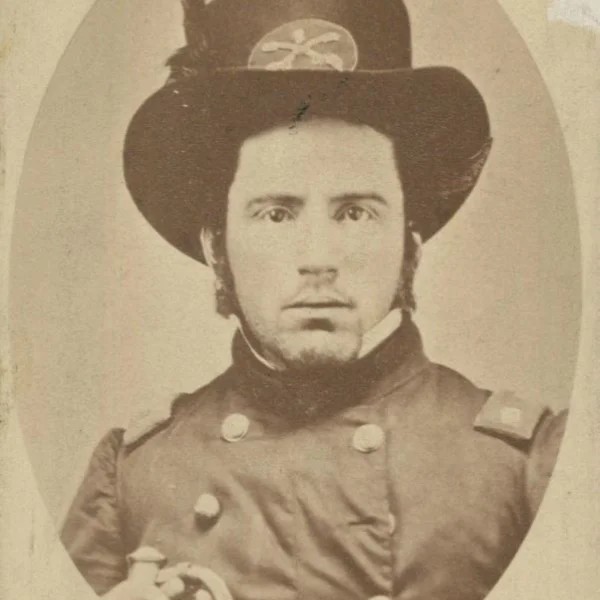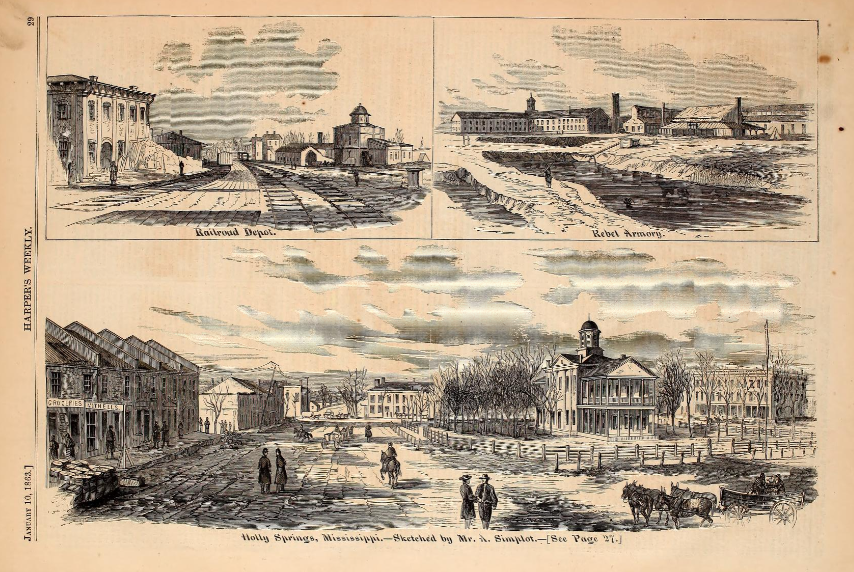Research Arsenal Spotlight 32: Henry Markham 2nd Illinois Cavalry
Henry Markham was born in 1840 to Lane Markham and Margaret (Griffin) Markham of Laporte County, Indiana. Both of Henry Markham’s parents died when he was quite young and he was raised by his uncle, Horace Markham (or Marcum). The twenty letters in our Research Arsenal collection were all written by Henry Markham to his cousin, Sarah Markham, who was the daughter of Horace.
On August 6, 1861, Henry Markham enlisted Company H of the 2nd Illinois Cavalry. Several other cousins of Henry’s were also in the regiment. They were Archibald “Archie” Markham and his brother, Daniel Markham, who were the sons of Uriah and Elizabeth (Adams) Markham and Aaron J. Markham who was the son of Charles B. and Barbara (Harsh) Markham.
The 2nd Illinois Cavalry at Union City, Tennessee.
On April 6, 1862, Henry Markham wrote to his cousin, Sarah, about their recent fighting at Union City, Tennessee. At the present time he was camped at Hickman, Kentucky, and described his current duties by saying, “We have but a small force here merely to keep down the bands of rebels who have hitherto been allowed to roam through the country unmolested.”
He then backtracked in time to talk about the successful battle against Confederate forces in Tennessee.
“Perhaps you have read it in the papers but for fear you have not, I will try and give you some of the particulars. On Sunday last about noon, Colonel [Napoleon] Buford landed here from Island No. 10 with a part of two regiments of infantry and was joined by three companies of cavalry and one battery of artillery consisting of four pieces and then we all started for Union City, Tennessee—a place about 14 miles from here where there was a rebel camp about 2,000 strong. We camped that night within four miles of them and attacked them the next morning [31 March 1862] just as they were at breakfast, taking [them] altogether by surprise. The cavalry was drawn up in front and fired a few shots at them but hardly one man out of ten had a chance to fire. I did not get a shot. The reason is we were not allowed to fire & while we were waiting for the artillery to get in position, they all fled, leaving almost everything behind them—even hot biscuits were on the table & I suppose they thought we were very ill mannered fellows to not allow them to finish their breakfast but we could not well help it. The artillery, however, fired a few shots at the enemy’s retreating cavalry. They killed two or three horses and one man left a piece of his leg with his dead horse. One or two of the pickets were also killed. None of our boys were hurt by the enemy but two of the artillery were badly burned by the gun being discharged too soon. There was one man badly wounded by one of their muskets going off in one of their tents while it was burning. Our boys got a good deal of plunder and much more was burned. Everything that could not be taken away was burned on the spot. Most of the tents was burned without ever looking in them. Some had guns, cartridges, and many other valuable things and it is said that they was going to burn one tent and a fellow hallowed inside and told them not to burn him and they went in and found a man tied in the tent. He was a man who had deserted from them and was to be shot in a few days but luckily for him, he was saved. We took about 90 horses and mules, and 15 wagons, and about 15 or 20 prisoners and a good many deserters came in and took the oath the next day.”
Continued Fighting and Skirmishes

Just two weeks after writing from Kentucky, Henry Markham and the 2nd Illinois Cavalry were at Groves Plantation, Louisiana, about 25 miles below Vicksburg. On April 21, 1862, Henry Markham wrote home about their new camp, as well as recent attack on their pickets.
“We moved here yesterday from about four miles back. We were at work all day yesterday fixing camp. We have got a nice camp now. About a week ago the rebels attacked our Cavalry pickets about a mile from this place. They crossed over the bayou in the night. About 500 men attacked our picket of about 25 men. They result was they wounded 2, captured 4 of our men, and some arms and horses and made good their escape across the bayou before we got to them. You will have doubtless heard before this reaches you of the gunboats & transports running the blockade. There was one of the transports that ran through came up this bayou day before yesterday and landed at our camp. I believe she did not get struck at all.”
In late August, 1862, the 2nd Illinois Cavalry were back in Tennessee, and faced a devastating loss in a skirmish against a much larger Confederate force. This skirmish resulted in the death of Lieutenant Colonel Harvey Hogg, who Henry Markham much admired. In a letter written on September 8, 1862, Henry Markham told his sister the details of the fight, though he was not a participant in it.
“We came here a week ago last Saturday and before we had been here one hour, four companies was sent out under Col. [Harvey] Hogg numbering in all about 200 men. But it so happened that our company was not sent out. They went but six miles and had one of the most severe skirmishes of the war. They made a charge which proved to be a fatal one to a number of our boys. Col. Hogg, one Lieutenant, and five or six others were killed. This regiment will miss Col. Hogg very much. He was Lieutenant-Colonel of this regiment and was by far the best officer in the the regiment. He always has had command of the part of the regiment that our company has been with and he was loved by all, I believe, without exception. And I do not think we ever will get another man as well suited to the place as he was. He was a native of this state and it will do them more good to kill him than almost any other man. He came from Bloomington, Illinois, and has no wife living but has two small children. I never shall forget the last time I saw him alive. He was riding through the camp just before starting out giving some command in his usual loud and stern voice and I thought he looked uncommon well. He had on a pair of white pants and a military cap and blue blouse which was an uncommon thing for him to wear. But alas, how the scene was changed in the short space of about 26 hours when his body was brought in riddled by seven balls, his boots, spurs, arms, and all his money was taken and his once white pants looked as though they never was of that color. The flesh of his face around his mouth was all gone and it looked really frightful. And so ended a truly great man a braver man never drew his sword in defense of his country’s right.”
Henry Markham and the Battle of Holly Springs, Mississippi.

On December 20, 1862, Confederate General Earl Van Dorn led a raid against the Union supply depot at Holly Springs, Mississippi. The raid resulted in the capture of numerous Union forces and the destruction of 1.5 million dollars’ worth of supplies.
The 2nd Illinois Cavalry was at Holly Springs during the raid, and Henry Markham’s letter from January 2, 1863, paints a picture of confusion as well as a daring rescue of his cousin, Daniel Markham.
“I now take this opportunity of writing you a few lines to let you know that I am still alive. You have doubtless heard that we were attacked at Holly Springs on the 20th of last month by the rebels under [General] Van Dorn and [Colonel] Jackson, 6,000 strong. There were about 300 of our cavalry there. There was some infantry there but they did not do any fighting worth naming. Our boys fought them about 2 hours and left the place to the Rebels. They staid there only about 5 hours and the place was occupied by our troops the next morning. There was eight killed in our regiment but one in our company [Jacob Oertel] was mortally wounded. He died just a week after the fight. He was from Macomb. There was eight wounded in our company. Dan [Markham] was shot through the thigh—a flesh wound. I think he will soon get well. He was sent to the hospital at Jackson, Tennessee. Aaron [Markham] had a ball pass through his hat scraping his head clear to the skull but it did him no material damage, He also had his horse wounded so he is not fit for service. Archey [Markham] lost his horse and escaped on foot. They took Daniel prisoner but we charged back into our camp and released him and several others and took about a dozen of them prisoners. Got our overcoats and blankets and left the camp. I saved yours and Charles’ likeness but lost it the next day out of my pocket which I regret very much. The rest of the boys of your acquaintance got through without a scratch but I tell you, the balls whistled a little closer than I like to have them.”
On January 23, 1863, Henry Markham wrote another letter to Sarah mentioning the raid at Holly Springs, Mississippi. The letter was written on a sheet of paper containing Special Field Orders No. 33, 13th Army Corps, Department of the Tennessee dated December 23, 1862, in which General Grant made special mention of the 2nd Illinois Cavalry at Holly Springs. After castigating the general conduct of the forces during the raid, Grant wrote:
“It is gratifying to notice in contrast with this, the conduct of a portion of the Command, conspicuous among whom was the Second Illinois Cavalry, who gallantly and successfully resisted being taken prisoners. Their loss was heavy, but the enemy’s was much greater. Such conduct as their’s will always insure success.”
In his letter, Henry Markham told his sister, “I will not say anything about the fight at Holly Springs for I suppose you have heard all about it before this but I send Grant’s order on this sheet and you can see what he thinks of our regiment.”
Although his cousins reenlisted in the 2nd Illinois Cavalry, Henry Markham did not and mustered out with the rest of the nonveterans on August 11, 1864. He married Margaret Smart in 1868 and died on June 6, 1883.
To read more of Henry Markham’s letters as well as thousands of other Civil War letters and documents, sign up for a Research Arsenal membership.
We’d like to give a special thanks to William Griffing of Spared & Shared for his work in transcribing and sharing these letters.
If you enjoyed this article, check out some of our other featured collections like Charles Miller of the 140th New York Infantry and Cornelius Van Houten of the 1st New Jersey Artillery.

